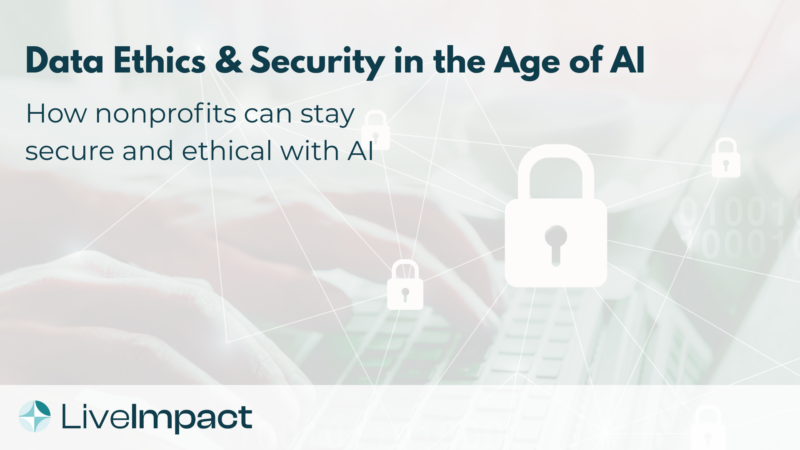AI is opening up exciting new possibilities for nonprofits. But with that opportunity comes responsibility. When your organization uses AI, you’re also making decisions about how your data, and your community’s data is handled.
From health records to donor wealth information, nonprofits manage some of the most sensitive data out there. As AI tools become more powerful, it’s critical to understand where your data goes, how it’s used, and what ethical boundaries need to be in place.
What Every Nonprofit Needs to Know
AI tools are advancing fast. So is their adoption across the nonprofit sector. But behind the excitement is a growing concern – how is your data being used?
If your nonprofit is exploring AI, you need to ask some hard questions. Who owns your data? Where is it going? How is it being used to train AI models? These aren’t just technical concerns. They go to the heart of your mission, your values, and your responsibility to your community.
Why It Matters
Nonprofits handle deeply sensitive data. This includes personal records like health status, housing history, immigration background, and social services usage. It also includes donor information such as giving history, income level, wealth indicators, and engagement patterns.
Sharing any of this data, even in anonymized form, without clear consent can compromise the trust you’ve worked hard to build.
Some AI vendors use data from multiple nonprofits to train large models. They may claim that data is anonymized. But anonymization is not always foolproof. And combining data across organizations can lead to patterns or assumptions that don’t reflect your community.
This is not just a privacy issue. It’s an equity issue. When AI models are trained without context or consent, they can reproduce bias. They can make decisions that feel impersonal or unfair. And they can shift control away from the nonprofit and the communities it serves.
Your Data, Your Responsibility
Here’s what every nonprofit leader should know:
- You are the data owner. If you collect it, or have rights to use it, you are responsible for how it’s used.
- Don’t assume anonymized means safe. Always ask how data is being stored and processed.
- Be cautious of pooled models. If a vendor is training AI across customers, your data may be part of that.
- Transparency is essential. You should be able to see how your data powers any AI tool you use.
- Don’t outsource ethics. Just because something is technically possible doesn’t mean it aligns with your mission.
- Understand the value of your data. Your data can power valuable AI tools and sometimes even commercial products. Make sure you know how that value is being used, shared, and whether your organization is being acknowledged or compensated.
Questions to Ask Vendors
Before adopting any AI tool, ask these questions:
- Where is your data stored?
- Who has access to it?
- Is your data used to train models for other organizations?
- Is there a way to audit how your data is used?
- Can you opt out of data sharing entirely?
- How do they monitor for bias in model outputs?
- What steps do they take to align with your privacy and compliance needs?
You don’t need to be a data scientist to ask these questions. You just need to be a steward of your mission.
Ethical AI Starts with Ownership
Nonprofits shouldn’t have to choose between using AI and protecting their values. You can do both. But it starts with choosing partners who respect your data, offer full transparency, and build models tailored specifically to your organization, without mixing your data with others.
When you retain control of your data, you get tools that reflect your context. You gain insights that are relevant. And you protect the privacy of the people who count on you.
Final Thought
Technology doesn’t define your mission. You do. AI should support your work – not shape it. That starts with owning your data story, asking the right questions, and choosing partners who share your values.


